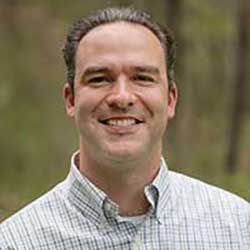
The ACOL Conference – Try a Direct Encounter
By Michael Mark
It can be hard to explain just how or why a particular source of wisdom moves us as it does. Challenges with anxiety and self-doubt earlier in my life, coupled with a deep-seated desire to make contact with what—at least in glimpses—was a loving universal reality, led me to A Course in Miracles (ACIM). This book was extremely helpful to me because it clarified sources of confusion I hadn’t previously been able to understand.  I studied it on my own for something like fifteen years—off and on. While the philosophy was never far from my attention, I drew closer to it in some times than others, like an orbiting moon.
I studied it on my own for something like fifteen years—off and on. While the philosophy was never far from my attention, I drew closer to it in some times than others, like an orbiting moon.
The basic idea of ACIM is that we don’t properly understand or interpret our experience, principally because we misunderstand who we are. It’s a common idea in many spiritual teachings. A fundamental idea contained in ACIM is that we are not purely physical beings, and that reality is not purely material, and that just about every value judgment we form is erroneous because of how we assign value, where we place our attention, and how we structure our thought given our misunderstanding. There’s the idea that we’re almost looking at things upside-down, or inside-out. Where we were intended to deeply know, express and rely upon the invulnerability of our being, instead we only seem to know ourselves as vulnerable, isolated, and alone. We’ve been bereft instead of heartened.
A key practice in ACIM is shifting our perception so that we learn to be at peace, with the idea being that as we withdraw our investment in falsehood, the truth will naturally be restored in our sight. One thing that can happen is that we can oversimplify this process—we learn to carve out this quiet niche of peace to which we remove ourselves when difficulty arises, but we don’t ever quite merge this bubble of genuine knowing with the entirety of our daily experience. It’s like we’re split in two almost. There is the world that nags and tugs at us, and then there is the peace to which we navigate, and we bounce back and forth as times demand.
I was recognizing this—that I could easily find my way back to peace, but also that I kept misplacing it—when I did a web search to see if there were any other modern spiritual teachings from Jesus that might be out there. If there was one, why not another? I knew, of course, that there was more than one. I’d also read A Way of Mastery, and a book I’ve long enjoyed is Dialogue on Awakening by Tom Carpenter. But I was curious. And that’s when I found A Course of Love (ACOL). It was sometime in 2012 I believe.
For me ACOL was just perfect. There was a fullness there, an emphasis on the importance of expressing who we are to become who we are—and not just in terms of speaking intellectually about the “idea” we have of ourselves, but of actually leaving behind the self-concepts to which we so often compare ourselves. The book touched me in a way that few have, and I’ve enjoyed returning to it on multiple occasions. Just like with ACIM, my orbit of ACOL seems to be elliptical—I approach and I retreat. But the retreat isn’t really a retreat as much as a deeper level of trust I think. A foray into genuine unity, without the training wheels. A digression into deeper meaning.
This is a long-winded preface for sharing with anyone who may be interested that this weekend there will be an on-line conference about A Course of Love. I’ve included a link below. This weekend marks the 20th Anniversary of Mari Perron’s receipt of the Course. I don’t feel there’s any substitute for encountering a teaching like this directly, but I also think if you’re drawn to participate in some fashion that this conference will be a direct encounter of its own. The power of ACOL is, for me, at least in part, the encouragement to live who we are. It’s a tall order, but the truth is we only do it together. We can’t sit in our rooms and polish ourselves up, then reach the proper state and go into town. There’s really no polishing required; rather, we need a certain vulnerability, a certain acceptance of who we are. An understanding of ourselves that is genuine, and can only come from discovering who we are through the sharing of who we are.
I’m a panelist in one or two of these videos, and had fun getting on these video calls to share in some creative encounters. If you’re interested, I hope you will check it out. Regardless, and as always, I hope just touching on these ideas for a moment or two here brings some peace to your day.
COMING TO YOU SOON!
THE FIRST-EVER ONLINE
ACOL CONFERENCE!
★ Register for FREE NOW for 40 sessions on Dec. 1st, 2nd, and 3rd!
★ Exclusive Book Offers available for purchase by all attendees including books autographed by Mari Perron
★ Extended Access for viewing after Dec. 4 is available for purchase. All proceeds support the nonprofit Center for A Course of Love
★ A Bonus Package comes with every Extended Access purchase
CLICK TO LEARN MORE AND TO REGISTER
Visit the Brand New Website
www.MariPerron.com

The Beckoning
By Paula Hardin
You are at the Humane Society
Seeking
Here
There
Suddenly
Heart skipping a beat
Eyes lighting up
The recognition
And a cage door opens
Or
Wandering the beach
Free from brain spin for the moment
Ahh yes . . . there
Tumbled smooth
Wet
A Stone
Sparkles
Just for you
Or
Sauntering in a bookstore
Remember those times?
Aisles, shelves, loaded with promise
Suddenly the beckoning
And you pick a book
Or it picks you
That happened online recently
And my universe
Turned other-side-around
Lighting everything
Lightening everything
Opening-opening-opening me (ouch)
To a fresh new world
Not yet mine.
Paula Payne Hardin appeared on the Oprah Winfrey Show when her first book, “What Are You Doing With the Rest of Your Life? Choices in Midlife” appeared in 1992. She is also the author of “Love After Love: Stages of Loving” (1996). Hardin directed Midlife Consulting Services and the David K. Hardin Generativity Trust in Chicago. Hardin has trekked around the world from the Himalayas to Zimbabwe. Now an Elder, she enjoys kayaking, cats, writing, and her extended family.




Dear Michael Mark, thank you for your words.
What is your experience of ACIM, if you say… I stayed close to the philosophy… Which part of A Course in Miracles is philosophy? Does it mean that I might consider ideas mentioned in it… I really don’t think so. Truth is true and nothing else is true. I let myself be changed by it or nothing is happening and I keep on dreaming.
Hi Wim,
Thanks for your note. I’m not entirely clear on what you are asking or clarifying, but if you’re trying to suggest it’s about more than intellectual logic—or what we might call philosophizing, which can be an endless churning of ideas, but without participation of the heart—then I would agree completely.
That said, if you search for the word ‘idea’ in A Course in Miracles you’ll find many interesting quotes that come to the fore. I do think that learning to live in accord with a different set of ideas is an important part of both these Courses. Not to intellectualize them, but to reorient ourselves around the true ideas they offer so that in time, we may experience that truth. In essence, it is the ideas we embody without even thinking about them—the ideas that we are, in a sense—that these Courses seek to help us change (or accept) within us.
I’d also say that it is not the point of either Course to abandon the mind. Maybe to abandon an orientation of our minds that can only deal in concepts. But wholeheartedness, to me, includes a reconciliation of the heart’s knowing with the mind’s ideas, so that they work together in profound partnership.
Peace,
Michael
Michael, thank you for this. It s beautifully written and really hit home!
Thank you very much, Lady! Glad you enjoyed it. Thanks for your note!
Peace,
Michael